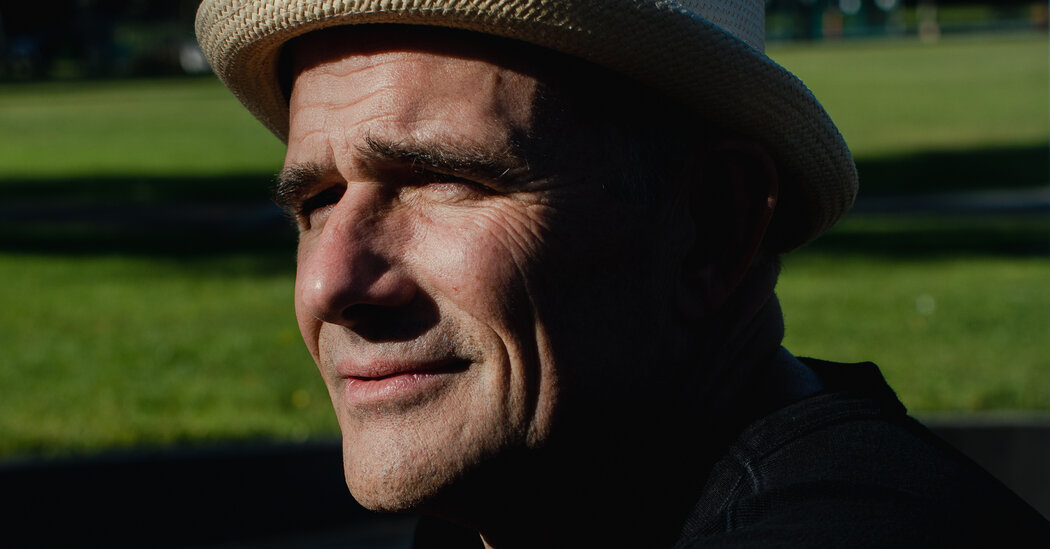Like Thomas Pynchon’s “Gravity’s Rainbow” and David Foster Wallace’s “Infinite Jest,” Mark Z. Danielewski’s odd, eerily compelling debut novel “House of Leaves” has a reputation for obscurity that’s daunting to some but intensely appealing to a certain kind of reader — mainly college-age intellectuals and nerdy postmodernists who can’t help but sympathize with one of their own.
Published 25 years ago, “House of Leaves” continues to attract new fans for its dense, multilayered narrative and intricate web of references, rendered in variegated typefaces and logorrheic footnotes, some of which run several pages long.
Danielewski’s work since has been more abstruse but less commercially successful. In 2015, he began an ambitious project called “The Familiar,” modeled on the form of a TV series, which would span 27 volumes of more than 800 pages each, representing “episodes” of an overarching “season.” Even by his standards, “The Familiar” was difficult, and the series was “canceled” after five installments.
“Tom’s Crossing,” the author’s latest novel, is by some distance his most accessible book. It tells the story of Kalin March, a teenager in the fictitious town of Orvop, Utah, who swears to his friend, Tom Gatestone, that he’ll save a pair of horses consigned to the slaughterhouse by seeing them safely into a meadow on the other side of some nearby mountains.
This rescue mission is a big, red-blooded adventure story in the classical sense, a page-turning western thrill ride featuring hardy chases, death-defying climbs and violent shootouts.
But it’s also, of course, a Mark Z. Danielewski novel, with all the literary allusions, sweeping mythology and formal audacity that usually entails, just streamlined into a recognizably mainstream package. In a recent Zoom interview, the novelist explained why the book was emotional to complete — and what secrets it might hold. (Responses have been edited and condensed.)
Did you consciously set out to write a more accessible book?
As I think you’re aware, “The Familiar” did not ultimately succeed, depending on how you look at it. It was a very interesting process, but when it was done, and when it didn’t work, I decided to do something else. The first decision was that I was going to write this book all by myself. I was going to live with it for years with no one else. There is a loneliness in this book. You are alone in this book like I was alone. But out of that loneliness emerges what I can only describe as a kind of vividness, which almost overwhelmed all the vividness that I was attempting to do by graphically rearranging the page, as I had done in “The Familiar” and “House of Leaves.”
It’s interesting that the book is being positioned as a straightforward adventure story, when, as you point out, it’s still quite recognizably strange.
Let’s put aside the way the book is being marketed. They’re going to do what they’re going to do. They’re a business making decisions about how to present it, and it’s really beyond what I can control. There’s no one that’s going to promote a book using the word ekphrastic. That’s just how it’s gonna go.
The book draws on your experiences in Utah. What was the appeal of that setting?
I knew early on that I wanted to write about Utah. I moved there in the summer of ’75, when I was 9, and I left in 1984. If we’d been members of the church, it would have been an experience of the ecstasy of belonging. We didn’t, so it was an ecstasy of estrangement. I have a great deal of affection for those years, but I have this unresolved desire to parse, excavate, get into what it meant to be constantly put on the outside. That was part of the impulse. The other part was that there was something about that part of the West that bewitched me, excited me and intrigued me.
Does the town of Orvop resemble where you were living at that time?
There was in fact a paddock on the corner of those streets, and there were in fact two horses, and there was in fact a rodeo. But I am not Kalin March. You are closer to Kalin March, with the name Calum Marsh.
There’s a moment about 350 pages into the novel where you suddenly list hundreds and hundreds of names — “the dead who were loved,” you call them. I Googled some, and they seemed to be real. Who are they?
I apologize if get weepy. I still don’t know how to talk about this. I’ve had for a long time a relationship with my readers. I asked readers if they had dead that they would like to see go to a greener place. And so … [Pause]. If I can try to explain the emotional impact, it’s that I spent weeks, months, reading these letters. They hit all at once.
Did it have a personal dimension for you, communing with the dead?
I think so. The dead walk with us, there’s no question. They’re walking with you. I don’t know who your Tom is, but the dead, too, require a kind of relief. Sometimes it’s only the living that can grant it to them.
I want to ask about the inclusion of real people who are still living, like the lead singer of Imagine Dragons. Why him?
Oh, I’m not going to tell you all the answers. This was all intentional. Despite its length, this was not a first draft.
“House of Leaves,” by design, lends itself to a kind of puzzle solving. I would have thought it’s less so with “Tom’s Crossing,” but are you saying that there are things to solve here?
I can’t even begin to forecast what the discussions will be. If you want to look at the typography, you will be rewarded. The small, riddling moments that occur in the parade of the dead, not to mention Tom or the history of Utah Valley, all of that, yeah, that’s there.
Why do you think “House of Leaves” continues to resonate?
I think it’s partly because it’s also about how we understand narratives. That’s why I think its popularity persists. Because what did happen? What is the story? That’s what we’re wrestling with every single day. Is this the story? How do we articulate a narrative that we can steer by in a good way, a way that’s kind and that greets the larger world we live in?
How did you feel completing “Tom’s Crossing”?
In some ways, I’m still kind of in a state of grief. It was also such a constant companion for me. When I finished the book, I felt — I really don’t know what’s left. It was a state of exhaustion which was somewhat pleasant. But then there’s something else, like, I miss them. I can’t imagine writing another story about them, but Kalin, Landry, Tom, the horses, even the Porches, all of them, they’re so vivid. When it’s done, it’s like, was I good enough for them? Was I good enough for the dead? Was I good enough for the material that was suddenly bequeathed on me?
And were you?
It’s a lifetime of work away from when I decided to be a writer, at the age of 10. This is the book of my life. It doesn’t matter if everyone says, “No, it was ‘House of Leaves’ — 25 years ago he peaked.” It’s OK! Fine. But for what I felt capable of expressing, the coalescence of what I’ve done and yet how that kind of exponentially propagates something new, that’s “Tom Crossing.”
The post He Wrote ‘House of Leaves,’ the Ultimate Cult Novel. He Hopes It Wasn’t His Peak. appeared first on New York Times.




